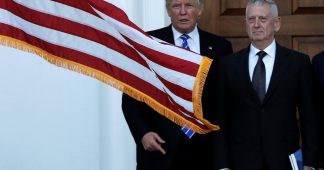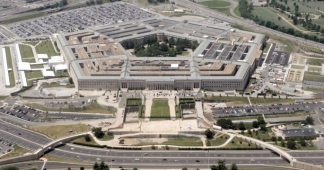By Philip Giraldi
June 26, 2018
I thought that perhaps I had tuned into John Oliver or to Saturday Night Live in error, but no doubt about it, there was an unmistakable President Donald Trump speaking before an audience at the National Space Council. He was saying that on his own presidential authority “I’m hereby directing the Department of Defense and Pentagon to immediately begin the process necessary to establish a space force as the sixth branch of the armed forces. … We are going to have the Air Force, and we are going to have the Space Force, separate but equal.”
Before signing Space Policy Directive 3 mandating the change and abruptly departing, Trump went on to explain that “My administration is reclaiming America’s heritage as the world’s greatest space-faring nation. The essence of the American character is to explore new horizons and to tame new frontiers. But our destiny, beyond the Earth, is not only a matter of national identity, but a matter of national security. It is not enough to merely have an American presence in space. We must have American dominance in space.”
The Air Force, which already has a Space Command, will no doubt object to the new arrangement, preferring instead to roll the expanded responsibilities and money into its already existing framework. Secretary of Defense James Mattis is also reported to be against the expansion, explaining in a speech last year that “The creation of an independent Space Corps, with the corresponding institutional growth and budget implications, does not address…our nation’s fiscal problems in a responsive manner.”
And Donald Trump will have to get over a couple of bureaucratic hurdles to get his nifty new interstellar command up and running. First of all, it will require an Act of Congress to create a new branch of the military. That might not be difficult to do as the expansion is being packaged as “national security,” which Republicans will support reflexively and Democrats will also get behind not wanting to appear weak before the elections in November. And both parties will also be willing to line up to benefit from the political contributions coming from defense contractors as well as the creation of new military support facilities providing jobs in congressional districts.
And then there is the money, alluded to by Mattis. Start-up funding a new, coequal military branch would mean a huge increase in the defense budget. As long as the dollar remains the world’s reserve currency and the treasury can print money without any real backing it is possible to ride the wave, but there are currently significant challenges to the dollars survival in that role. If its supremacy ends, there goes the economy taking the unrestrained government spending with it and sinking the Space Command together with much, much more.
Major defense contractors, all of whom were present to hear Trump’s speech, were immediately seen to be drooling over the prospect of a new cash cow. And at the Pentagon champagne corks were popping at the thought of a couple of hundred new flag officer positions that will have to be invented and filled as well as the full complement of civilians to staff the bureaucracy. And think of the uniforms that will have to be distinct from those used by the other branches of the service, maybe copying those formerly in vogue on the Starship Enterprise or as seen in the movie Starship Troopers.
The reality is that the United States does indeed have a major national security interest in protecting its network of satellites in orbit as well as related infrastructure, but there is still quite a lot in the Trump remarks that is disturbing. Trump is basically saying two things. The first is that he will be weaponizing outer space and the second is that he is doing so because he intends for the United States to become dominant in that domain. It is a complete ass-backwards approach to the problem of potential development of threats coming from beyond the atmosphere. Instead of arming outer space, Washington should be working with other countries that have capabilities in that region to demilitarize exploration and both commercial and government exploitation. Everyone has an interest in not allowing outer space to become the next site for an arms race, though admittedly working with other countries does not appear to be something that the Trump Administration enters into lightly. Or at all.
And Trump should also abandon his insistence that the United States develop “dominance” in space. The use of such language is a red flag that will make any agreement with countries like Russia and China impossible to achieve. It virtually guarantees that there will be a competition among a number of nations to develop and deploy killer satellites employing lasers and other advanced electronic jamming technologies to protect their own outer space infrastructure.
Trump appears to have internalized a viewpoint that sees the United States as surrounded by threats but able to emerge victorious by being hyper-aggressive on all fronts. It is a posture that might unnerve opponents and bring some success in the short term but which ultimately will create a genuine threat as the rest of the world lines up against Washington. That day might be coming if one goes by the reaction to recent U.S. votes in the United Nations and Trump’s behavior at G-7 are anything to go by.
No one in his right mind would allow Trump to dominate outer space based on Washington’s track record of irresponsible leadership since 9/11. It has wrecked the Middle East, South Asia and North Africa, killing possibly as many as 4 million Muslims in so doing. It has bullied allies into joining its projects in places like Iraq, Afghanistan and Syria while also disparaging foreign governments and entering into trade wars. It has bankrupted itself in all but name, systematically dismantled the rights of its own citizens, and has become a rogue nation by virtually every measure.
And when you have firmly established the principle that might makes right and all the universe is at the disposal of Washington, what comes next? Antarctica and the arctic region are by some accounts rich in natural resources. Will we Americans be seeing an Antarctic Command with a mandate to dominate the polar regions to enhance national security? Stay tuned.
* Philip M. Giraldi, Ph.D., is Executive Director of the Council for the National Interest, a 501(c)3 tax deductible educational foundation that seeks a more interests-based U.S. foreign policy in the Middle East. Website is www.councilforthenationalinterest.org, address is P.O. Box 2157, Purcellville VA 20134 and its email is inform@cnionline.org.










